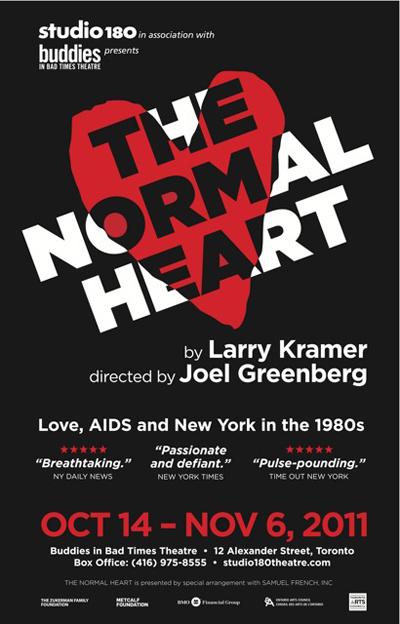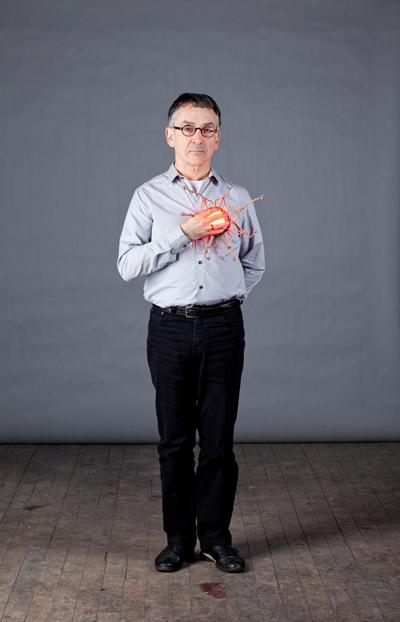
Credit: Tanja-Tiziana, doublecrossed.ca
On April 21, 1985, former Hollywood script doctor, controversial author and pioneering AIDS activist Larry Kramer fired a warning shot across the bow of the American establishment.
The occasion was the opening night of Kramer’s autobiographical play The Normal Heart at New York’s Public Theater. The play, which explores the early days of the AIDS crisis, ran an unprecedented 294 performances. By the time he wrote the piece, Kramer, who The Advocate later called “the most belligerent man in America,” was already a polarizing figure in the gay community.
Kramer’s 1978 novel Faggots, which examines the sexually charged lifestyle of the Fire Island gay party scene, remains one of the most reviled and best-selling works of gay fiction. In 1982 Kramer instigated the formation of the Gay Men’s Health Crisis (GMHC), one of the first major advocacy groups to respond to the wave of baffling deaths from what the media initially dubbed “gay cancer.”
Kramer’s firebrand style of polemical politics, combined with what some call an anti-sex bent, led in 1983 to his ouster from the GMHC. Kramer found himself simultaneously frustrated by the lack of meaningful response to AIDS from New York City Hall and cast out of the group he helped to form to fight for change.
Following a trip to the memorial at Dachau – the first Nazi concentration camp established in Germany – Kramer was stirred by the mass apathy that had partly facilitated the Holocaust. It was in this spirit that Kramer penned The Normal Heart as an act of outraged passion and a strident call for sanity in insane times.
Kramer would invoke the Shoah many times, both in the play and elsewhere, as a metaphor for the inaction that allowed thousands to perish from what was temporarily known as GRID (gay-related immune deficiency). During the early ’80s, many Americans favoured quarantining those infected with HIV. In light of this, the shrillness of Kramer’s tone seems a reasonable response. As Leo Bersani writes in his essay “Is the Rectum a Grave?” the “danger in not exaggerating the hostility to homosexuality ‘legitimized’ by AIDS is that . . . we may soon find ourselves in situations where exaggeration will be difficult, if not impossible.”
Following the recent Tony Award-winning Broadway revival of The Normal Heart, Toronto’s Studio 180 Theatre is mounting a production of Kramer’s seminal work at Buddies in Bad Times Theatre. Studio 180’s previous political work includes The Laramie Project, David Hare’s Stuff Happens and, most recently, Our Class by Tadeusz Slobodzianek.
Director Joel Greenberg says he believes in the contemporary relevance of The Normal Heart and anticipates that the piece will resonate with a diverse audience.
“I hope that our audiences are composed of a very wide age demographic,” he says. “I find it fascinating that the piece is just as potent now as it was [when it was written].”
Ryan Kelly, a performer in the play, speaks to the often-overlooked complexity of Kramer’s politics: “It’s not that easy to ride a wave of liberation, [and] nobody wanted to be told to watch themselves . . . I wouldn’t have wanted to be told.”
Kelly has performed in several recent productions, each of which revolve around an AIDS narrative, including Sky Gilbert’s I Have AIDS! and the musical Living with Henry, which will be remounted in January as part of the Next Stage Theatre Festival. Kelly says he is thankful to be able to make a living as a performer in queer activist theatre. He admits that regardless of the problematic implications of Kramer’s message – that curbing sexual promiscuity prevents the spread of AIDS – in this case, “Kramer was right.”
Lawrence D Mass, a co-founder of GMHC, titled his 1997 collection of essays about Kramer We Must Love One Another or Die. The title comes from queer poet WH Auden’s “September 1, 1939.” Auden wrote the poem in a Hell’s Kitchen gay bar. The title refers to the invasion by Nazi Germany of Poland, the curtain-raiser to the atrocities of the Second World War. Much like Auden before him, Kramer’s The Normal Heart stands as both a warning and a plea for compassionate action in the face of apathy and the unknown. Twenty-five years after the play’s premiere, the slogan most associated with ACT UP – a radical queer rights group also co-founded by Kramer – still says it all: silence = death.

 Why you can trust Xtra
Why you can trust Xtra


